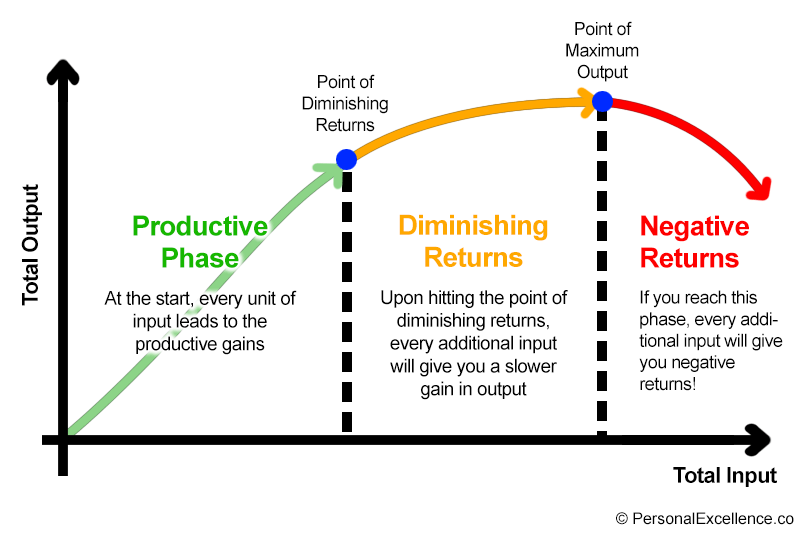The law of diminishing returns is a concept that I learned in Economics and I find it very applicable to personal growth. Here’s what it says:
The law of diminishing returns states that in productive processes, increasing a factor of production by one, while holding all others constant, will at some point return lower output per incremental input unit.[1]
Let’s say you have a corn field and you are trying to increase the yield with fertilizer. While adding fertilizer initially will lead to a sharp increase in yield, this increase tapers off when an optimal amount of fertilizer has been added.
The point when it tapers off is called the point of diminishing returns, and every unit of fertilizer from this point on will give you a smaller increase in corn yield, even though this fertilizer is the exact same quality as before. This is known as diminishing returns.
If you keep adding more fertilizer beyond this point, you will eventually get negative returns, where your total yield decreases because the field is over-fertilized!

(Image: Personal Excellence)
Diminishing Returns in Our Life
If you examine different areas of your life, you’ll find the law of diminishing returns at work:
- Work. While working non-stop from day to night, for seven days a week, sounds like a good idea to get ahead work-wise, the reality is that we get diminishing returns in our productivity after long hours of work.
- Facebook. While using Facebook can be fun as part of catching up with your news feed and seeing what everyone is up to, the gains are diminishing after some time of using it and after checking it for the nth time. (Do it excessively and we start to feel drained instead. That’s negative returns, where an activity drains rather than uplifts you.)
- Learning. The first book we read on a particular topic is usually the most helpful as we learn the fundamental concepts on the topic. Reading 10 books on that very topic may be even more helpful. But to read 20, 30, 50 books on the exact same thing? You will find the gains minimal as the authors talk about the same things in different ways. (The exception is if the book is exceptionally written with its unique value-add to the topic.)
- Meetings. The first hour of a work meeting is usually the most productive, while the subsequent second or third hour, not so much. When a meeting drags on endlessly, it becomes a time suck for everyone involved. The same can be observed when you have an excessive number of meetings each week.
As a writer, there are points in my writing when I can see that I’ve reached a roadblock, and spending more time writing doesn’t net me productive gains. This can be after one, three, or five hours of writing, depending on what I’m writing. That’s my point of diminishing returns.
Likewise, with podcast editing, there is a point in my editing when spending more time listening to the podcast, splicing the audio track, and cutting out “um’s” and “ah’s” don’t lead to very productive gains. Doing it the first time helps create a neater listening experience yes, but to do it a second, third, or fourth time? That’s not so productive. To do this for multiple rounds would lead to diminishing, perhaps even negative returns as the podcast gets over-edited.
Understanding the concept of diminishing returns is important as it helps us learn when to stop, and when to press on.
- In terms of improving overall productivity at work, instead of working relentlessly at our desk when we hit minimal or negative gains, we should actually stop, take a breather, and come back later with a more energized mind.
- In terms of perfecting a work task, instead of trying to perfect every little action and rework something to the point of oblivion, we should consider if we are creating real value this way or if we can add better value elsewhere, such as by channeling our time into other new projects or tasks.
- In terms of improving personal wellness, instead of working non-stop without rest every day and week, we should take time out for our family, relationships, and well-being, especially when we feel tired or burnt out. When we have spent 100 hours on work, the 101th hour is not going to be as rewarding if we continue to spend it on work, vs. if we spend it with our family and loved ones.
Diminishing Returns – Context Matters
At the same time, context matters when determining if a gain is diminishing or not.
In terms of perfecting a work task, there is a time where achieving the maximum, best outcome for a specific task should be strived for, despite diminishing returns. That’s when the benefits of achieving maximum output outweighs the costs of getting there.
For example, a writer may want to revise a book over and over until it is perfect — even when the 20th revision leads to diminishing returns (in quality). That’s because his goal is to write the best book on the topic, and the eventual gain of doing — in terms of market recognition, sales growth, etc. — so far outweighs the work needed to get there. As professional writer Danny Strong, who won two Emmys and two Writers Guild of America Awards for his writing, says, “I’ve never done a project that I haven’t rewritten at least 20 times, if not more.”[1]
So here, the output is the quality of the book — and it may take a lot of effort to achieve the final 10% in book quality. But this final 10% gain in quality may be instrumental in separating you from rest of the people in the field, i.e. the market leader effect. There are many gains that come with achieving the best output — market recognition, sales, audience growth, reputation — that cannot be seen by narrowly focusing on just the single metric of book quality.
You also have to consider your goal in the bigger scheme of things — because while you may be getting good gains at work, you may be getting diminishing gains in terms of the value-add to your life. This is why some actors start to reject work when they’re at the peak of their career, in favor of family time — that’s because the gains from working further, even if they are extremely well-paying, are diminishing to them, while family time, that’s much more rewarding. Here, the larger context is what you want for your life and your end objective. You have to ask yourself if the gains from switching to focus on a particular category (e.g. health, family, relationships) will be more rewarding than focusing on the same thing (e.g. work) for you.
How To Know When Diminishing Returns is Happening
How do you know when diminishing or negative returns kick in? The first way is to track and measure.
Say you want to grow your blog traffic with guest posting. You decide to guest post on site X. While your 1st, 2nd, and 3rd guest posts generate 300-400 new visitors each, your 4th guest post only generates 100 new visitors. Assuming all things constant, your 4th post has led to diminishing gains. If your 5th post at site X generates similar to lower results vs. your 4th post, it’s probably time to pick a different site, or explore a different traffic building strategy altogether.
The second way is to use your gut feel. This becomes very effective as you gain more experience in work and life, and can accurately assess whether it pays to continue on with a task, or switch tasks, or — an even bigger consideration — switch your focus to a different life area.
Ask yourself:
- What marginal benefit will I get from spending another hour on this? What change, difference can I make?
- Is this marginal benefit worth the additional cost (the extra time, effort) of achieving it? Every action has an opportunity cost — considering all the other things you can do with this time, effort, is it worthwhile to strive for the marginal benefit, or use that for other projects or purpose?
- Is there any other task or area where you can better spend this time?
If the marginal benefit outweighs the additional cost, then yes, continue on with the task and what you’re doing. If not, then it’s probably time to switch gears and focus elsewhere.
For example,
- Say you’ve been writing an article for an hour and it’s going nowhere. At this point, the marginal benefit of writing another hour is likely diminishing — you may want to switch tasks to something else that’s more pressing or energizing for you, then return to the article later when you’re in the mood.
- Or let’s say you’ve been working long hours for a big goal for your software company. You’ve spent 60 hours working that week, at the expense of family time. While you can spend the 61st hour working, the reality (to you) is that the marginal benefit of working for another 3 hours (having already worked 60 hours that week) is diminishing. To you, working for 3 additional hours results in diminishing gains, while switching to focus on your family, going out, or just spending some time together — that’s much more meaningful.
When it comes to a particular work task, look at what the best folks are doing for ideas and reference. Sometimes we may have a precise vision in our mind that we relentlessly pursue, but this could be just a target that makes little difference to people. Neurotic perfectionists are guilty of this.
With editing for my podcast, I shared in my perfectionism series that I could go crazy with my editing and edit the heck out of my audio clips. But after reviewing top-rated podcasts, I realized these folks don’t even bother to edit out their “um’s” and “ah’s,” which incidentally doesn’t affect me as a listener. When I thought about it, I realized such ums, ahs, and at-times tangential comments are normal speech patterns that don’t negatively affect the quality of an episode, as long as not in excess.
By asking the questions above, it helps you take a step back and evaluate the benefits that can be gained vs. the costs required to achieve these benefits. This is important for perfectionists, who have a habit of taking things to the extreme and maxing out every variable. And in doing so, continually pick options that let you maximize your productivity, well-being, and happiness.
If you feel that the law of diminishing returns reminds you of the 80/20 rule, they are indeed related. The 80/20 rule states that 80% of results are caused by 20% of key factors. Usually, the effort required to achieve the final 20% of results, such that a piece of work becomes “perfect,” takes an astonishing amount (80%) of effort. This is when diminishing returns kick in, and this is when you need to decide if the state of perfection is worth this huge amount of incremental effort, or if you should move on and focus on more important projects (or areas of life).
Watch Out for Diminishing Returns in Your Life
Are there any areas in your life where diminishing returns are in action? Some examples:
- Work:
- Are you spending too much time on a specific work task? Are you reaching diminishing returns, and if so is it time to switch tasks?
- Are you spending too much time at work? Are you reaching diminishing returns in terms of your productivity?
- Overall:
- Are you spending so much time in a particular life area (e.g. career) that you’re neglecting the other life areas (e.g. health, relationships)?
- Are the gains in this life area worth it, or are they diminishing?
- Is there any other life area you can focus on to to get meaningful gains? Is there any new habit (e.g. meditation, reading) or activity (e.g. time with family) you can switch to that can have better rewards than spending the xth hour on the same thing?
- Relationships:
- Are you trying to keep up with so many friends that you’ve compromised on your life?
- Are you spending so much time with a person (your best friend; your partner) that it’s leading to diminishing gains for both of you? (For example, neglected life priorities? neglecting other relationships?)
- Daily life:
- Are you sleeping more than necessary to be well-rested?
- Are you engaging in recreation, watching TV, or playing games past the point of adequate enjoyment?
- Are you spending more time on Facebook/social media than necessary?
Exercise your gut and become conscious of diminishing returns in your life. This will be extremely useful as you optimize not just your productivity, but also your fulfillment in life.









 Thanks for reading. If you like my free articles, join my private email list and get my latest updates and articles sent right to your inbox.
Thanks for reading. If you like my free articles, join my private email list and get my latest updates and articles sent right to your inbox.